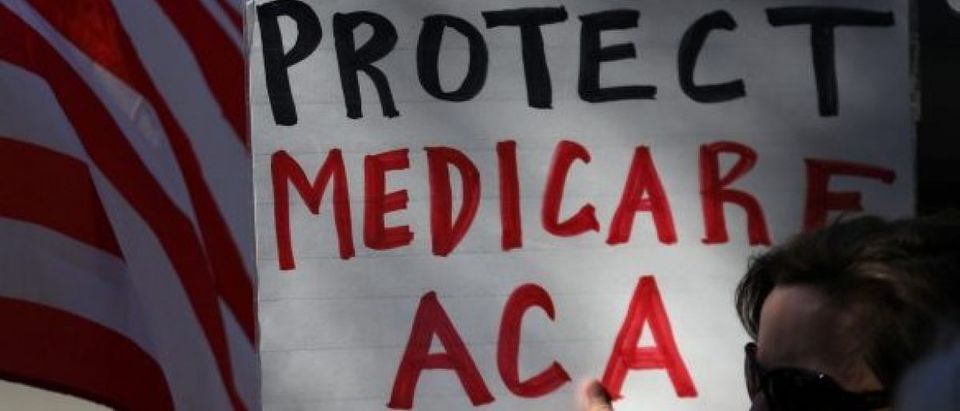The U.S. District Court of Appeals for the District of Columbia is scheduled to hear from President Donald Trump’s administration and House leadership May 22 in the ongoing battle over funding the Obamacare cost-sharing reductions (CSRs).
Background
Under the leadership of former Speaker John Boehner, the House filed suit against the Obama administration in 2014, claiming it was illegally reimbursing marketplace insurers for a little known feature of Obamacare: CSRs.
Obamacare requires insurers to provide CSRs to low and moderate income individuals who participate in the exchanges. To make consumers put more “skin in the game,” Obamacare effectively raised deductibles to levels that are tough for many Americans to meet without some financial support. CSRs were instituted to help insurers with the costs of the deductibles patients can’t otherwise meet.
Under Obamacare, insurers cover the cost of the patient’s deductible and the federal government reimburses the provider for what they pay out.
Boehner, along with House leadership, felt that CSRs required an annual appropriation approved by Congress. The House argued that because Congress had never explicitly appropriated the funds for those payments, the administration’s actions were unconstitutional. After nearly two years of deliberation, Senior Judge of the U.S. District Court for the District of Columbia Rosemary M. Collyer concluded the House’s claim had legal standing and allowed the case move forward May 12, 2016.
The Obama administration then appealed the decision. The case remains open, with no definitive ruling. Republicans have pushed back the court date twice. In February, Trump and Ryan got a hold approved until May 22. (RELATED: The Potentially ‘Unconstitutional’ Feature Of Obamacare Everyone Is Ignoring)
There are a few possible scenarios for how Monday’s meeting could play out, some that would benefit consumers and others that would leave consumers and insurers in hot water.
1) Judge Grants A Continuance
Trump and House leadership could ask the judge to grant them a continuance, as Republicans have already done twice. In February, Trump and Ryan got a second hold approved until May 22. A troubling result of the appeal and numerous Republican-led delays is that CSRs are still funded as they were when the Obama administration first appealed.
If they ask for another continuance and it is granted, uncertainty for insurance providers as to whether or not the administration will continue paying out CSRs goes nowhere. Insurers may make hasty decisions, or try to compensate for the uncertainty in other means, like raising prices for other consumer groups to make up the difference.
2) Trump Administration Moves Forward Or Withdraws From The Appeal
If Trump and Ryan forgo a continuance, they will face a difficult decision: pursue or withdraw the Obama administration’s appeal.
If the pair decide to forward the appeal and the 2016 ruling is upheld, Trump and Ryan would be one step closer to their goal of dismantling Obamacare.
Withdrawing from the appeal, however, could bring a host of economic and political problems upon the new administration. If Trump decides to let Obamacare “implode” and withdraws the appeal, he will effectively leave insurers with up to $7 billion in bad debt and consumers with backbreaking premiums.
As it stands, some $7 billion is allocated to CSRs this year and another $10 billion is slated for 2018.
The problem then for Trump and Republican leadership is that if they don’t fund the program for 2017, they leave insurers, who are already paying out billions in CSRs, without any chance of reimbursement from the federal government.
Withdrawing from the appeal also means the 2016 ruling that the House’s claim had legal standing that the appropriation is unconstitutional prevails. Essentially, the current Congressional appropriation for cost-sharing reductions is unconstitutional.
3) Judge Forces Administration Into A Decision
The judge could presumably get tired of the numerous Republican delays and deny a continuance in the case, which would require the administration and House leadership to return to court for a final hearing. Trump and Ryan would then be forced to answer the previous scenario.
One of the main problems with Obamacare are the skyrocketing premiums. Insurers pull out of marketplaces where it is not cost-efficient for them to provide services, and, as a result, consumers are left with fewer options at higher prices. (RELATED: White House: Obamacare Premiums Will Rise By Double Digits Next Year)
If Trump and Ryan choose to not reimburse insurers for CSRs, insurers would be forced to increase plan premiums. Insurers will not simply eat the difference between what the enrollee pays and what they are left to cover. The excess cost will be shifted to the larger consumer base through higher premiums, according to research by the Department of Health and Human Services (HHS) and the Urban Institute.
Send tips to robert@dailycallernewsfoundation.org
All content created by the Daily Caller News Foundation, an independent and nonpartisan newswire service, is available without charge to any legitimate news publisher that can provide a large audience. All republished articles must include our logo, our reporter’s byline and their DCNF affiliation. For any questions about our guidelines or partnering with us, please contact licensing@dailycallernewsfoundation.org.


